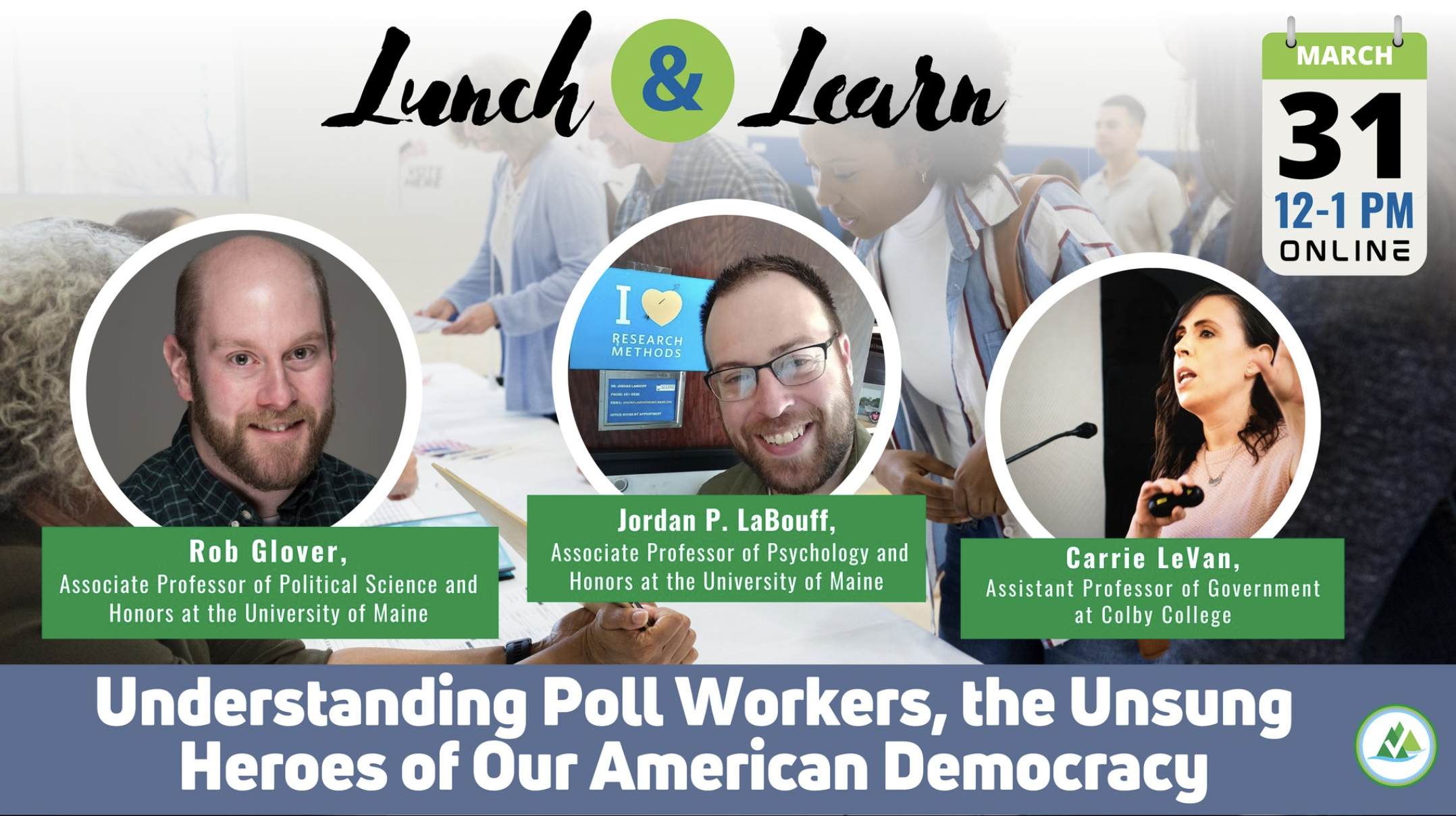Chapter Spotlight: Maine SSN Works to Improve Poll Worker Recruitment and Trust in Elections
“Poll workers are an integral part of Maine’s election system. The research that Dr. Glover, Dr. LaBouff and Dr. LeVan are conducting is giving us more information about the motivations that bring poll workers to serve in this capacity and what is effective in reaching them for recruitment. This will be extremely helpful to election officials as we work to ensure we have an adequate number of poll workers signed up to work at future elections.” - Maine Secretary of State Bellows
Every year, poll workers help to administer thousands of elections across the country, from major statewide contests to local referenda and budget initiatives. At the same time, trust in the electoral process has taken a hit due to a torrent of mis- and disinformation being spread in the wake of the 2020 presidential election. To understand how to improve the recruitment of poll workers and what effects this volunteerism might have on shoring up trust in our electoral systems, Maine SSN chapter leaders Rob Glover and Jordan LaBouff joined forces with Maine SSN member Carrie LeVan to launch a new research project.
Funded through the Scholars Strategy Network’s Election Protection and Enhancement Program, Glover, LaBouff and LeVan set out to launch a survey of poll workers before and after the 2022 midterms. Their findings show both how to effectively recruit poll workers and just how important this civic engagement opportunity can be: serving as a poll worker consistently improved trust in elections and American democracy.
Glover and LaBouff have long been interested in the role of poll workers, helping to recruit students at their university to volunteer for local elections. “Anecdotally, we could see that that was having a really interesting impact on students, the way that they were thinking about their role within democracy,” said Glover. So when SSN launched the election program, they saw an opportunity to study these effects in more detail. LeVan, a long-time SSN member who had relocated to Maine a few years earlier, was quickly brought on board given her research on civic participation.
To design their survey, the three researchers connected with officials who run and oversee elections in the state to understand the concerns and challenges they face and what questions would be most helpful to answer. “I can't even add up the kind of cumulative years of experience that we were talking to – we spoke with a number of different town clerks, most of whom had been serving in their positions for decades, and then the Secretary of State's office,” said Glover. The group was able to set up these collaborations through a combination of personal connections in a small state like Maine, as well as their prior work relating to civic engagement and poll worker recruitment.
“Their sense was that people who participate in that process probably come away with, you know, a kind of warm fuzzy feeling about the people doing the work, but also a real sense of security that the results that are posted on election night or a few days after actually reflect the will of the voters,” said Glover about talking to town clerks. “And that is in fact what we found when we did this research.”
At a presentation hosted by the Maine Conservation Voters in late March, Glover, LaBouff, and LeVan presented the full range of their findings and key takeaways. Beyond a clear improvement in trust in elections, they were able to shed light on who is serving as poll workers and how to improve recruitment.

In general, they found that the majority of poll workers in Maine are older, female, have a college degree or above, and are retired. When it comes to recruiting these volunteers, they found that messages around civic duty and democracy resonate the most and that personal outreach from family, friends, colleagues, and town clerks themselves is the most successful. “If our public are concerned about the integrity of elections and participating in elections are helping shore that up, then we need to fund opportunities for people to participate in those elections and find ways to do that,” said LeBouff at the presentation. LeVan added:
“The fact that we found attitude shifts at all is actually a really big deal. What we know is that it’s really hard to change attitudes and beliefs…The idea that we could have people who believe that fraud is happening or who are nervous about voter intimidation and they come into this experience believing that this is going to happen and then they change those attitudes is actually a really big deal in this moment, when so many American are worried.”
The group is now working to disseminate their findings and takeaways to town clerks across the state. This will include local press, including an OpEd in the Kennebec Journal, as well as a presentation at an annual meeting of town clerks. Maine Secretary of State Shenna Bellows wrote to SSN in response to their efforts:
“Poll workers are an integral part of Maine’s election system. The research that Dr. Glover, Dr. LaBouff and Dr. LeVan are conducting is giving us more information about the motivations that bring poll workers to serve in this capacity and what is effective in reaching them for recruitment. This will be extremely helpful to election officials as we work to ensure we have an adequate number of poll workers signed up to work at future elections.”
Looking ahead, the group plans to continue their research during the 2024 elections to expand on their findings. Their hope is that with the help of the Secretary of State’s office, they’ll be able to reach even more towns across the state to both increase their survey sample and the buy-in from local town clerks, perhaps even sharing their insights beyond the state of Maine.
